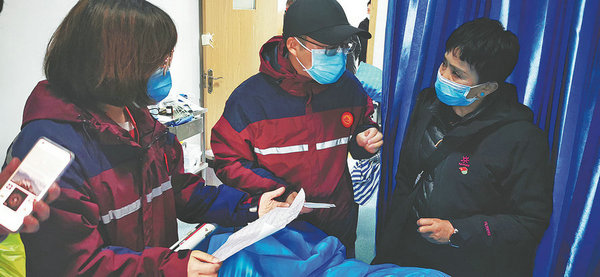The highest level of care


According to Chen, under the guidance of successive batches of Shaanxi medical aid teams, a group of competent neonatal medical specialists and nurses have been trained at the hospital. They have mastered numerous medical techniques that have filled gaps in neonatal treatment provision in Ngari prefecture.
As the number of lives saved at the hospital grows, more locals are coming for treatment. Chen says that stroke, trauma and the critical maternity treatment centers are all being planned.
Du Xudong, 37, a general surgeon at Xi'an No 3 Hospital, the Affiliated Hospital of Northwest University, is the youngest doctor among those from the seventh batch working at the Ngari hospital.
As Ngari is situated 4,500 meters above sea level, Du says that it took him about two months to get acclimatized.
During the past year, he has done nearly 300 surgeries, each one lasting between one and five hours. On more than one occasion he has performed up to six surgeries a day.
During each surgery, Du has to wear a 5-meter-long oxygen tube to ensure he can perform the surgery properly. He is so focused on the job at hand that it's easy to forget about the oxygen deficiency at high altitude. It's usually only after finishing a long surgery that he notices how completely physically deflated he is.
Sometimes, when called upon to perform emergency surgery at night, Du finds it difficult to sleep afterward because of the low oxygen level.
He has noticed that the physical mechanism of his plateau-dwelling patients differs from those who live on the plains, so he needs to treat them accordingly, as they require more time to recover from surgery.
He led his team to complete the hospital's first hernia surgery and, ever since, local patients haven't needed to travel the 1,600 kilometers to Lhasa for treatment.
The biggest obstacle the team faced upon arrival was the lack of medical equipment. New instruments have since been sent to Ngari.
Another challenging, but key, task for the team is the training of local doctors and nurses. "On one hand we come to Ngari to teach the staff here, and on the other hand we take doctors back to Shaanxi to learn more skills and gain vital experience," Du says.
He notes that one of his trainees has applied for six months of further study at the Second Affiliated Hospital of Xi'an Jiaotong University.
Du and three surgical colleagues have created a training group, in which each of the quartet takes turns to deliver a lecture online on Thursday afternoons for doctors of the seven county-level hospitals in Ngari.
"Some hospitals aren't equipped to perform surgery, so by starting this group, the doctors will know to whom they should transfer their patients when they need help," Du says.
Holding voluntary clinics is also one of the team's jobs. According to Du, on weekends and holidays, Chen led the team to visit all the counties in Ngari, which are scattered across hundreds of kilometers.
Since 2015, when the Shaanxi medical aid team for Tibet was founded, seven batches of 150 medical experts have been dedicated to enhancing the level of local medical treatment in Ngari. The eighth batch has already picked up the baton, starting its tour of duty last month.
The number of outpatients visiting the Ngari hospital last year almost doubled compared with that of 2015. In the same time period, the per capita life expectancy in the prefecture has increased from 57 years old in 2015, to 62 today.
The medical treatment level of the Ngari hospital, and seven other county-level hospitals in the area, have all been elevated.
Xue Li, one doctor on the seventh medical aid team, who is a urologist from the Second Affiliated Hospital of Xi'an Jiaotong University, says that their purpose is not only to save the lives of patients, but to provide the medical technology and skills to local medical staff in Ngari prefecture and improve their level and capability of medical treatment so that local people's well-being is further enhanced.




































